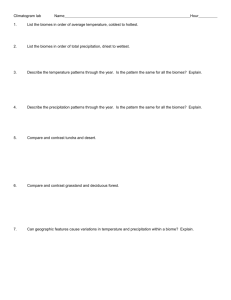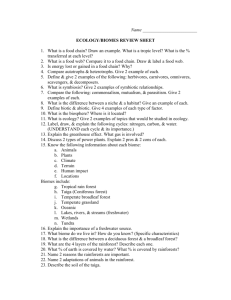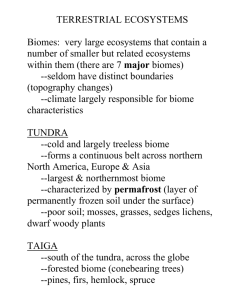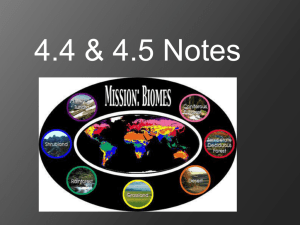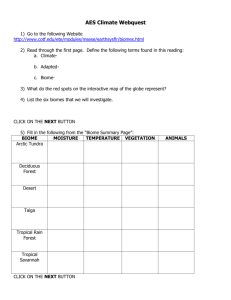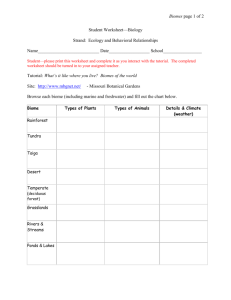Biomes_notes
advertisement
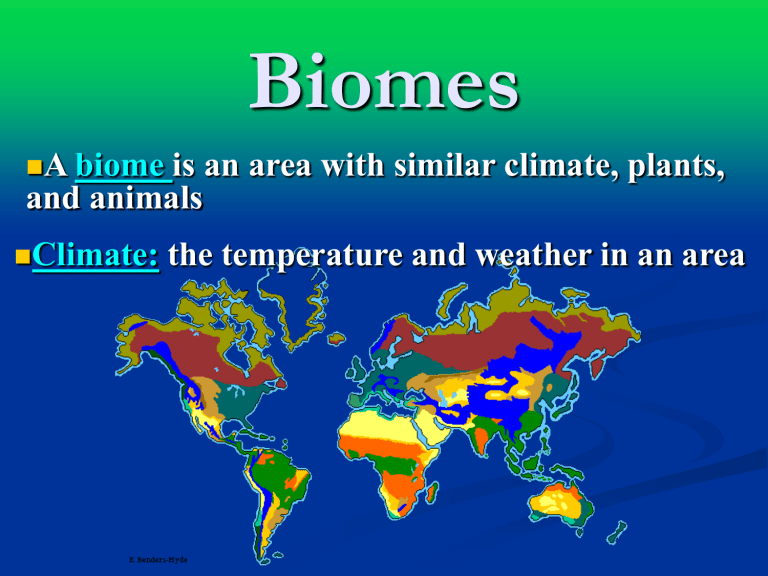
Biomes A biome is an area with similar climate, plants, and animals Climate: the temperature and weather in an area Biomes 1. 2. A biome ___ is an area with similar climate, plants, and animals There are 2 Types of Biomes: Aquatic (Water) Terrestrial (Land) Aquatic Biomes Aquatic Biomes are those biomes located in water bodies of ______. All Aquatic Biomes are based upon the salinity (saltiness) of the water. Also, the aquatic biomes takes up the most space on Earth. 70% of the Earth is covered in oceans!!! Terrestrial Biomes land . Terrestrial biomes are biomes located on _____ All Terrestrial Biomes are based upon the various types of Climate Patterns. There are 6 Types of Terrestrial Biomes: 1. Tundra 2. Taiga 3. Desert 4. Grassland 5. Deciduous Forest 6. Tropical Rainforest Tundra Tundra environments have cold weather. extremely _____ Very little precipitation (like a cold desert) snow Most precipitation is _____. Most animals growing thick fur and the plants remain small. The permafrost which is a layer of soil is __________, permanently frozen ground. Tundra Taiga Desert Grassland Deciduous Forest Tropical Rainforest Very cold, mostly snow, permafrost, small plants, thick fur Taiga Taiga is also very cold with long severe _______ winters summers and short, dry ________. Taiga gets moderate precipitation (some as rain and some as snow) There are many adaptable trees such as evergreen trees. Tundra Very cold, lots of snow, permafrost, small plants, thick fur Taiga Long harsh winters, short summers, evergreen trees Desert Grassland Deciduous Forest Tropical Rainforest Desert hot Desert environments are ____ & ____. dry Animals adapt to this environment by constantly water conserving (saving) ______ when it is needed for them most. Animals are usually nocturnal. Nocturnal animals are those day and that sleep during the ____, night when it is much cooler. come out at _____ Tundra Very cold, lots of snow, permafrost, small plants, thick fur Taiga Long severe winters, dry summers, animals migrate Desert Hot, dry- plants and animals conserve (save) water Grassland Deciduous Forest Tropical Rainforest Grassland Grasslands environments experience a ____ wet& ____dry season. Temperatures are moderate (can range from freezing to hot) Many animals in this are _______ grazing animals (feed upon plants, grass, etc.) rich The soil in this area is _____. Tundra Very cold, lots of snow, permafrost, small plants, thick fur Taiga Long harsh winters, short summers, animals migrate Desert Hot, dry – plants and animals conserve water Grassland Rich soil, wet and dry season, hot and cold temperatures Deciduous Forest Tropical Rainforest Deciduous Forest Deciduous Forest environments have an abundant level of precipitation _________. They also have 4 distinct seasons ______. Trees usually lose their winter leaves in the ______. This is also the Biome where WE LIVE! Tundra Very cold, lots of snow, permafrost, small plants, thick fur Taiga Long severe winters, dry summers, animals migrate Desert Hot, dry – nocturnal animals, conserve water Grassland Rich soil, wet and dry season, grazing animals Deciduous Forest Plenty of precipitation, 4 seasons, leaves fall Tropical Rainforest Tropical Rainforest Tropical Rain Forest environment is the warmest _______ wettest of all biomes. & _______ It is found in areas near the ________. equator Most life severely depends sunlight available. upon the _______ Lots of rain (especially in the Spring). Tundra Very cold, lots of snow, permafrost, small plants, thick fur Taiga Long severe winters, dry summers, animals migrate Desert Hot, dry – nocturnal animals, conserve water Grassland Rich soil, wet and dry season, grazing animals Deciduous Forest Plenty of precipitation, 4 seasons, leaves fall Tropical Rainforest Warm and very wet, lots of plantlife Climatograms A climatogram is a graph that shows climate (average monthly values for two factors: temperature and precipitation.) Temperature is expressed in degrees Celsius and is plotted as a smooth curve. Precipitation values are given in centimeters. Rain Forest Is the temperature of each Biome: Hot, moderate, or cold? Mountains - Moderate Tundra - Cold Desert - Hot Grassland - Moderate Taiga - Cold Deciduous forest - Moderate Tropical rainforest - Hot Rain Forest Desert Tundra Grassland Deciduous forest Taiga Look at your climatograms. I am a plant that can live where it is very cold (usually below 0° C), but I need plenty of precipitation. First: Look for the climatograms that show the coldest temperatures. They are…. Taiga Tundra But: Which one ALSO has plenty of precipitation? Lets look at the climatograms for precipitation for Tundra and Taiga. Taiga Tundra Which one has plenty of precipitation? Taiga or Tundra? So… What is the answer for: I am a plant that can live where it is very cold (usually below 0° C), but I need plenty of precipitation. How do you know? Why can it not be any other biome? Look at your climatograms. Vole: An animal that lives in a moderate climate, AND Needs enough water during the wet season to survive the dry season. First: Look for the climatograms that show the MODERATE temperatures. They are…. Grassland Deciduous Forest But: Which one ALSO has a dry and wet season? Lets look at the climatograms for precipitation for Grassland and Deciduous. Grassland Deciduous Forest Which one has a dry and wet season? What is the answer for: Vole: An animal that lives in a moderate climate, AND Needs enough water during the wet season to survive the dry season. How do you know? Why can it not be any other biome? Look at your climatograms. Answer: Shrub: A plant that can live where it is very warm (usually above 10° C), with very little precipitation. How do you know? http://geography4kids.com/files/land_biomela nd.html http://www.learnnc.org/lp/external/biomes Climate • Weather conditions over a long period of time
